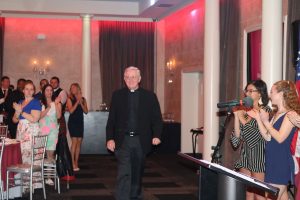New core curriculum proposed
May 7, 2014
Iona’s proposed changes to its core curriculum were presented on March 29 in Romita Auditorium. The presentation was a culmination of the efforts of faculty and staff, who have been working on the proposed core since the summer of 2013.
The core review is co-chaired by Dr. Tricia Mulligan and Dr. Michael Jordan, who work with five other faculty members from various departments. The presentation was the first opportunity for those who aren’t a part of the review group to see the proposed changes and ask questions about them.
“The new core will provide a common, yet distinctly Iona, experience to all students,” Mulligan said. “At the same time, students will find that they have more flexibility in choosing what classes to take.”
If all goes according to plan, the freshman class entering Iona in the 2015-16 school year will be the first to experience the new core, which has several new requirements aimed at creating connections among subject areas, students and faculty.
The first of these new requirements is the four- credit Columba Cornerstone, a class which first-semester freshman will be required to take. Initially, students will pick from three “core themes.” These themes will dictate which of three, one-credit, “modules” (one hour classes) students will take. Each module looks at the chosen theme through a different academic lens.
Among the examples of possible themes were “Sustainability and the Ecological Citizen,” “Ethics and the Just Economic Citizen” and “Truth and the Inquisitive Citizen.”
The fourth and final credit of the Cornerstone requires, among other things, the submission of an E-portfolio and the completion of a module that provides a background of the history of Iona.
“The purpose of the Cornerstone is to get students thinking about the ‘big questions’ while also exploring diversity and drawing connections between subjects,” Mulligan said. “Additionally, students will find themselves sharing classes with the same groups of students and professors, forming learning communities.”
After completing the Columba Cornerstone, students will be required to begin completion of an “Integrated Core Theme (ICT).” The ICT is similar to the Cornerstone in that students will choose a “centerpiece” course, which must be completed by the end of sophomore year.
After finishing the centerpiece students will take three other courses that relate to the centerpiece in some way. For example, if a student chose medieval studies as their ICT, the centerpiece course would be an English course on medieval literature.
To complete the ICT, the student would then pick three classes from a list of courses related to medieval studies such as: Infectious Diseases (Biology), Passion Plays (Fine Performing Arts), and Europe in the Middle Ages (History).
While only 12 different ICT themes were provided at the presentation, Mulligan was sure to add that the list is limited only by the imagination. Professors will have the ability to collaborate with each other and create new themes as they please.
The main question, which was raised by more than one professor at the presentation, concerned the lack of a foreign language requirement. Several professors, including Dr. Teresa Delgado of the religious studies department, felt that it was an oversight.
“I just don’t understand how we intend to ‘Move the World’ as an institution, in English only,” Delgado said. “I feel that tagline becomes somewhat disingenuous given the lack of any foreign language requirement.”
The review group responded to the concerns by citing the lack of foreign language requirements in the curricula of other institutions in addition to the fact that a relatively low number of students who take introductory courses in a foreign language actually continue on to attain proficiency.
“Throughout this process we are forced to make a lot of compromises and a lot of hard choices,” Mulligan said. “In this case, we just did not feel that we needed to require a foreign language.”
“While we will not require a foreign language class, students will find that they have plenty of room in their schedules to explore a foreign language if they feel compelled to do so,” she said.
The core proposal also calls for the creation of a new administrative body consisting of a director of the core and a core advisory committee. The director of the core will be responsible for administration of the core curriculum, a job that requires continual assessment and improvement of the core.
According to a timeline of the core approval process, the proposal will be finalized this summer and once the various committees and administrative personnel approve the plan, it will be submitted to the State of New York by December 1, 2014. This timing would allow implementation of the new curriculum at the beginning of the 2015-16 school year.
“It’s still very much a work-in-progress,” said Jordan. “There’s going to be a certain amount of reevaluation.”







